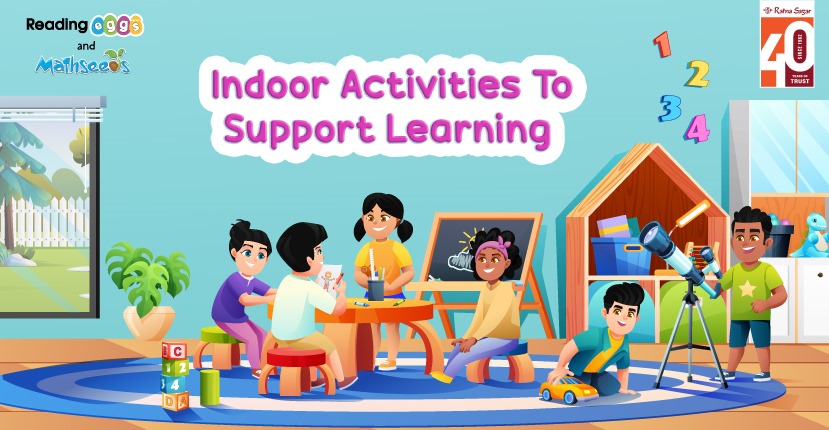
Indoor Activities to Support Learning
When it comes to children, every day is an opportunity for exploration and learning. For them, everything is an interesting and new item. While outdoor play is fantastic for physical development and interaction with nature, indoor activities also offer endless possibilities for growth and creativity. Whether you’re dealing with rainy days, extreme weather, or just need to stay inside, here are some engaging indoor activities that can support your child’s learning and development.
1.Building With Blocks
Blocks are a timeless favourite for children, and for good reason. They help develop fine motor skills, hand-eye coordination, and spatial awareness. Encourage your child to build towers, castles, or any structure they can imagine. This not only enhances creativity but also introduces basic concepts of structuring and balance.
Learning Benefits:
Fine Motor Skills: Grasping and stacking blocks strengthens little hands and fingers.
Problem-Solving: Figuring out how to balance blocks or create stable structures teaches persistence and critical thinking.
Early Maths Skills: Counting blocks, sorting by colour or size, and understanding shapes are all foundational Maths concepts.
2.Arts and Crafts Time
Arts and crafts provide a wonderful way for children to express themselves. Simple activities like finger painting, colouring, or making collages with various materials can stimulate creativity and help them develop essential skills.
Learning Benefits:
Creativity and Imagination: Arts and crafts encourage children to explore their creativity and make their ideas come to life.
Fine Motor Skills: Cutting, glueing, and colouring help strengthen hand muscles and improve coordination.
Language Development: Talking about their artwork helps expand vocabulary and communication skills.
Book 14 days FREE trial For UKG Maths Worksheet
3. Storytelling and Puppet Shows
Storytime is not just about reading books; it’s also about engaging your child in storytelling. Create a mini puppet theatre with socks or paper bags, and let your child narrate a story. This activity fosters imagination and improves language skills.
Learning Benefits:
Language Skills: Listening to and telling stories enhances vocabulary, sentence structure, and comprehension.
Social-Emotional Development: Acting out stories allows children to explore emotions and develop empathy.
Imagination: Creating their own stories or imagining scenarios helps in creative thinking.
4.Sorting and Matching Games
children love to sort and match objects, whether it’s sorting toys by colour or matching socks. These activities are not only fun but also introduce them to categorization and help develop critical thinking.
Learning Benefits:
Cognitive Development: Sorting and matching help with understanding similarities and differences, an important cognitive skill.
Early Maths Skills: These activities introduce the concept of classification and sets, which are fundamental in mathematics.
Concentration: Focus and attention to detail are required when sorting and matching, which helps in developing concentration.
5.Interactive Learning Programmes
Learning programmes can be a fantastic resource for supporting your child’s learning.
Programmes designed for early learning can introduce your child to letters, numbers, shapes, and more through interactive play. Check out “Reading Eggs and Mathseeds” for the best play based learning activities for children.
Learning Benefits:
Digital Literacy: Introducing children to technology in a controlled way helps build basic digital skills.
Interactive Learning: Apps often use games and challenges to teach concepts, which can be highly engaging for children.
Language and Math Skills: Many apps focus on fundamental skills like letter recognition, counting, and shape identification.
Book 14 days FREE trial For UKG Maths Worksheet
6. Music and Dance
Music is a powerful tool for learning, and it’s something children naturally enjoy. Singing songs, dancing, and playing simple instruments like shakers or drums can help with language development, coordination, and rhythm. You may also engage kids in making their own DIY musical instrument. For ideas, check out the blog on “How to Create a DIY Musical Instrument with Household Items”
Learning Benefits:
Language Development: Singing introduces new words, phrases, and concepts in a fun, memorable way.
Motor Skills: Dancing helps improve coordination, balance, and gross motor skills.
Memory and Sequencing: Learning the lyrics to songs or the steps to a dance enhances memory and sequencing skills.
7.Simple Science Experiments
Introducing basic science concepts through simple experiments can be both educational and entertaining. Activities like mixing colours, exploring water properties, or watching seeds sprout can ignite curiosity and foster a love for science.
Learning Benefits:
Curiosity and Inquiry: Simple experiments encourage children to ask questions and explore the world around them.
Problem-Solving: Experimenting teaches children about cause and effect and helps develop critical thinking skills.
Early Science Concepts: Concepts like colour mixing, density, and growth are introduced in a hands-on, understandable way.
8.Cooking Together
Cooking with children might seem like a challenge, but it’s a fantastic way to introduce them to Maths, science, and healthy eating habits. Simple tasks like stirring, pouring, or sprinkling toppings can make them feel involved and important.
Learning Benefits:
Maths Skills: Measuring ingredients introduces basic Maths concepts like counting and volume.
Fine Motor Skills: Pouring, stirring, and spreading help develop precision and control.
Life Skills: Cooking teaches patience, following directions, and the importance of nutrition.
Indoor activities are a fantastic way to support your child’s learning while keeping them engaged and entertained. Each of these activities offers unique opportunities for growth, whether it’s developing fine motor skills, enhancing creativity, or introducing early Maths and language concepts. With a little creativity, you can turn any day indoors into a fun and educational experience for your child.
